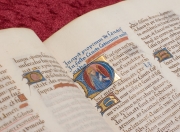Taking up the Psalter
The Mirror Image of Life. As I considered the matter, I felt sure that these points would be helpful to my friends. And yet, something more was needed. What was it? I began paging through the hymnal they were accustomed to use, and as I did so, it became more and more evident what had to be said about the advantage of the Psalter.
This is what I noticed. Like the Psalter, the hymnal contained numerous hymns that praised and thanked God, and many others that recalled the beauty of His creation and extolled His unceasing providence. Faith, and hope in His promises were duly expressed, and the fellowship of Christian believers extolled. Hymns celebrating the mystery of Christ in the Church Year were not lacking either. Indeed, a number of them were beautiful paraphrases of the great Christological Psalms.
Unlike the Psalter, however, there was not one angry hymn in the entire collection. So often we feel the need to pour out our rage to God in prayer. How will the hymnal help us then? Perhaps this is precisely the point at which the Psalter is most valuable for our needs today, and the point at which our current worship books and hymnals fall short. The Psalter is true to life; it accords so accurately with the rawness of human experience. It leaves nothing unsaid, no emotion unexpressed.
I knew then that I would have to tell my friends the whole truth about the Psalter, and what might happen to them if they took it up.
First of all, the Psalms would expose the pain of living, and demand that they face squarely every condition of human suffering. Betrayal by friends (Ps 54[55]), attacks of enemies (Ps 55[56]), the unfairness of a world in which the wicked seem to get rewards, and the just, for all their devoted piety, seem afflicted with endless trouble (Ps 72[73]) – it is all there, in graphic detail. The ultimate issues of sickness and death receive particular attention:
Spent and utterly crushed,
I cry aloud in anguish of heart. (Ps 37[38]:9)
You have given me a short span of days;
my life is as nothing in your sight (Ps 38[39]:6)
Take away your scourge from me.
I am crushed by the blows of your hand. (Ps 37[38]:11)
This sort of prayer disorients life. It threatens security. It hurts! We are frightened.
But it would not be enough merely to expose pain. More is needed. There must also be a response on the part of the believing heart. It must do something with this pain. It must present it to God!
“Here my voice, O God, as I complain!” (Ps 63[64]:1).
These words were frequently to be found on the lips of some of the greatest saints! Curses, complaints and laments abound in the Psalter. And this is good.
Taking up the Psalter makes a bold statement to the world about the relationship between God and the human family. God cares how we feel. He cares about all our feelings, especially the ones we find so difficult to deal with. Since the Psalter is His inspired word, it is clear that He expects to hear from us when we are fed up with the disappointment and suffering of life. Even when we are fed up with God!


Leave a Reply